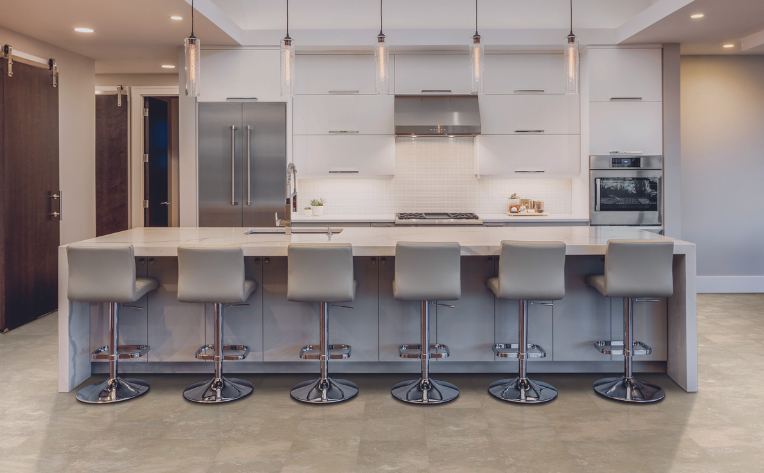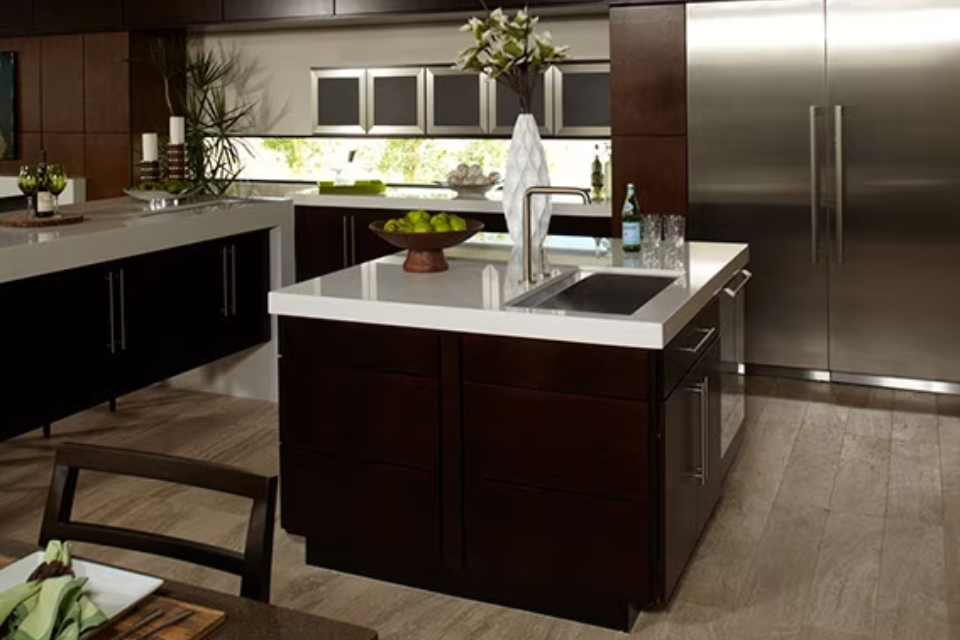Feb 07, 2024 | Flooring Canada

Discover the allure of travertine tile, a sophisticated choice in modern interior design trends. Whether you're familiar with it or not, we've got you covered. Dive into the world of travertine tile and stone flooring as we explore its aesthetics, weigh the pros and cons, and share effective cleaning tips. Elevate your home's ambiance with the timeless charm of travertine tile flooring for a stunning makeover.
Derived from mineral deposits in natural springs, travertine is a natural sedimentary stone, akin to the granite in your kitchen or the marble in your bathroom. This distinctive stone showcases unique swirls and patterns, adding a touch of natural elegance to any space. Its formation over time lends travertine its distinctive and striking appearance, making it a captivating choice for various applications in interior design.

Travertine is a very durable and versatile stone, which is why it's commonly used for flooring and backsplashes. It is available in four styles and textures:
Brushed Travertine: Brushed travertine has a non-reflective, matte finish that offers a rustic look. This look is created by using a wire brush treatment.
Honed Travertine: Honed travertine is halfway between matte and glossy. This creates a balanced, subtly polished look. The honed texture is created by buffing the unfinished side of the travertine.
Polished Travertine: Shiny and glossy, polished travertine is an eye-catching, sophisticated style. It offers a luxurious, high-end look.
Tumbled Travertine: Tumbled travertine tile offers an aged appearance by tumbling the stones to create rough edges honed slightly to smooth any jagged edges.
With this wide range of textural styles, a warm buttery colour palette ranging from earth tone colours to beige hues, and a durability that can withstand even the heaviest of wear-and-tear, travertine floor tile makes a timeless yet trendy addition to any home.

Torreon Travertine Tile by Daltile
Like any other type of flooring, travertine tile possesses a blend of qualities that make it ideal for some settings, but potentially unsuitable for others. If you’ve been thinking about upgrading your floors, here are some pros and cons to consider when deciding whether or not travertine is a good fit for your home:
Beauty: It’s impossible to deny the lavish, classical beauty of travertine floors.
Durability: With proper treatment and maintenance, travertine protects against scratching and cracking, making it perfect for homes with pets and children.
Value: Travertine floors are a budget-friendly option to other high-end stones such as marble or granite. Installing travertine flooring can also increase the value of your home.
Non-Slip: Travertine floors are naturally non-slippery, which makes them ideal for moisture-prone spaces such as bathrooms and kitchens.
Versatility: Travertine tiles are easily cut and shaped, which allows for custom designing and customizing tiles to fit into smaller spaces.
Maintenance: Travertine tile flooring must be sealed during installation and re-sealed every three to five years to keep it moisture- and stain-resistant. For the best results, leaving this process to flooring experts, like our trained installers at Flooring Canada is best.
Comfortability Underfoot: Since travertine is a type of natural stone tile, it feels firmer than other flooring materials and is harder underfoot. It's also heavier than other types of natural stones.
Temperature: Like other natural stone tiles, travertine tends to stay cool. While this is ideal for those in warmer climates, this might be a big drawback for those in cooler environments.
Sensitivity: While travertine is durable, it is very sensitive to acidic substances like vinegar, coffee, juice, and alcohol. Acidic liquids are more likely to leave a stain if spilled since they react with travertine’s calcium carbonate.
If coziness, warmth, and ease of maintenance are your major priorities, travertine may not be the best flooring material for your flooring redesign project. On the other hand, travertine could be the perfect option if you like the sound of a trend-setting, damage-resistant material that will elevate your home's beauty and financial worth. At Flooring Canada, we’re here to help you decide based on your style preferences, lifestyle needs, and renovation budget.

Travertine Crosscut Silver Tile by Emser
Like other types of natural stone flooring, travertine floors contain tiny, porous openings. Even though these openings are nearly invisible to the naked eye, they are still large enough to absorb moisture and admit harmful debris particles.
Over time, this can damage travertine floors, making them more susceptible to premature discolouration, chipping, and cracking. Treating travertine with sealers when the floors are installed properly is important to reduce the risk of damage. Sealants must be reapplied every three to five years to ensure lasting protection against damage. Fortunately, our expert installers at Flooring Canada are here to save you the headache! They'll come prepared with the correct tools, materials, and sealants to ensure a long-lasting floor.
Once travertine floors have been installed and sealant is applied, cleaning and maintenance are fairly straightforward. To get the best results from travertine tile cleaning, simply wipe down or mop the tiles with a gentle, non-staining, non-abrasive cleaning solution recommended by the manufacturer. When in doubt, always consult the original manufacturer for product-specific care recommendations about what cleaning solutions you can use on your travertine floors.

Esplanade Travertine Glazed Porcelain by Emser
Find the perfect travertine tile backsplash and travertine tile for kitchens, bathrooms, foyers, or any room in your home. Explore inspiring options and chat with our friendly team by visiting your local Flooring Canada today to experience our catalog of stunning travertine floors.